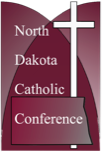Helping Those Who Help
By Christopher Dodson
Executive Director
North Dakota Catholic Conference
April 2023
In North Dakota, entities of the dioceses or affiliated with the Church do great work. One of the tasks of the North Dakota Catholic Conference is to help them do that work.
Catholic Charities of North Dakota has several programs connected to legislation and state government. When a court ordered what is now the Life Skills and Transition Center in Grafton to move residents with intellectual disabilities into community settings, it contracted with Catholic Charities so that it could act as guardians for the former residents. Funding for that program is essentially the state’s responsibility. The funding must be reconsidered and appropriated by the legislature every session. The funding is, however, never enough.
More recently, the state asked Catholic Charities to serve as guardians for vulnerable adults. This program also needs an appropriation by the state.
Catholic Charities also has a contract with the state to operate the Adults Adopting Special Kids (AASK) program. AASK provides services to children in foster care and to the families who adopt them. It is funded mostly by federal funds passing through the state.
Even when the state provides no funding, laws can affect how these programs operate. This is also true with other adoption services Catholic Charities provides. None of it is funded by the state at this time. However, state law specifies many requirements for facilitating an adoption.
Home on the Range is a therapeutic working ranch under the auspices of the Bismarck Diocese. The facility provides education, therapy, spiritual guidance, and recreational and work activities. Some of its residents are within the foster care system. That system is, of course, directed by state laws and regulations. Home on the Range currently focuses on youth who have been or are at risk of being sexually trafficked. That requires special services. The North Dakota Catholic Conference is working with legislators and state administrators to find a way that the ranch can best serve these youth within the state’s laws and parameters.
The Catholic Church has thirty-four Catholic schools in the state. North Dakota ranks near the top when it comes to placing regulations on nonpublic schools. Every nonpublic school must meet all the same requirements to operate that a public school must meet. Nonpublic school teachers must have the same licenses that public school teachers must have. Every legislative session these requirements might change. The North Dakota Catholic Conference works with the State Association of Nonpublic Schools to monitor and respond to these proposed changes.
We also work to convince the state to provide some financial assistance to the parents who choose to send their children to a nonpublic school. All children have a right to state-supported education. Parents, as the primary educators of their children, have a right to choose the best educational setting for their children. The two rights are not mutually exclusive. School choice is a matter of justice.
North Dakota has thirty-eight Catholic healthcare facilities. None of them are diocesan owned. They are owned by Catholic healthcare systems or religious communities. In more recent years, the facilities work with the legislature through their own systems, the North Dakota Hospital Association, or the North Dakota Long-Term Care Association. Sometimes, however, legislation might come up that impacts the ability of Catholic facilities to adhere to the ethical obligations of a Catholic entity. In these cases, the North Dakota Catholic Conference becomes involved. At the same time, the Church’s teachings about the right of healthcare for all and the preferential option for the poor necessitate involvement by the conference on broader healthcare legislation.
Some ministries in the state are not officially Catholic but have a close relationship with the Church. Some of the pregnancy resource centers and Saint Gianna & Pietro Molla Maternity Home are examples. The first priority of the North Dakota Catholic Conference when it comes to these facilities is to ensure that they can do the work they do. Some people want to over-regulate or completely shut down these important pro-life ministries. The Catholic Conference watches for such proposals and works to defeat them.
The second priority for the conference concerning these facilities is to advocate for some financial assistance. The Alternatives to Abortion program was passed in 2005 to provide some financial assistance to these facilities when they help pregnant women choose life. This year, we hope to expand that program so state help is also available when they help new mothers, their infants, and new fathers.
I sometimes look at my work at the Catholic Conference like this: I am a policy guy. I don’t “do people service.” I probably would not be good at it anyway. But God has given others that gift. They directly help people. They hold their hands, listen to their stories, protect them, sustain them, and treat them. My job at the North Dakota Catholic Conference is to do what I can to make sure that they can do the ministries God has gifted them to do.
What We Do
The North Dakota Catholic Conference acts on behalf of the Roman Catholic bishops of North Dakota to respond to public policy issues of concern to the Catholic Church and to educate Catholics and the general public about Catholic social doctrine.

Contact Us
North Dakota Catholic Conference
103 South Third Street, Suite 10
Bismarck, North Dakota
58501
1-888-419-1237
701-223-2519
Contact Us

